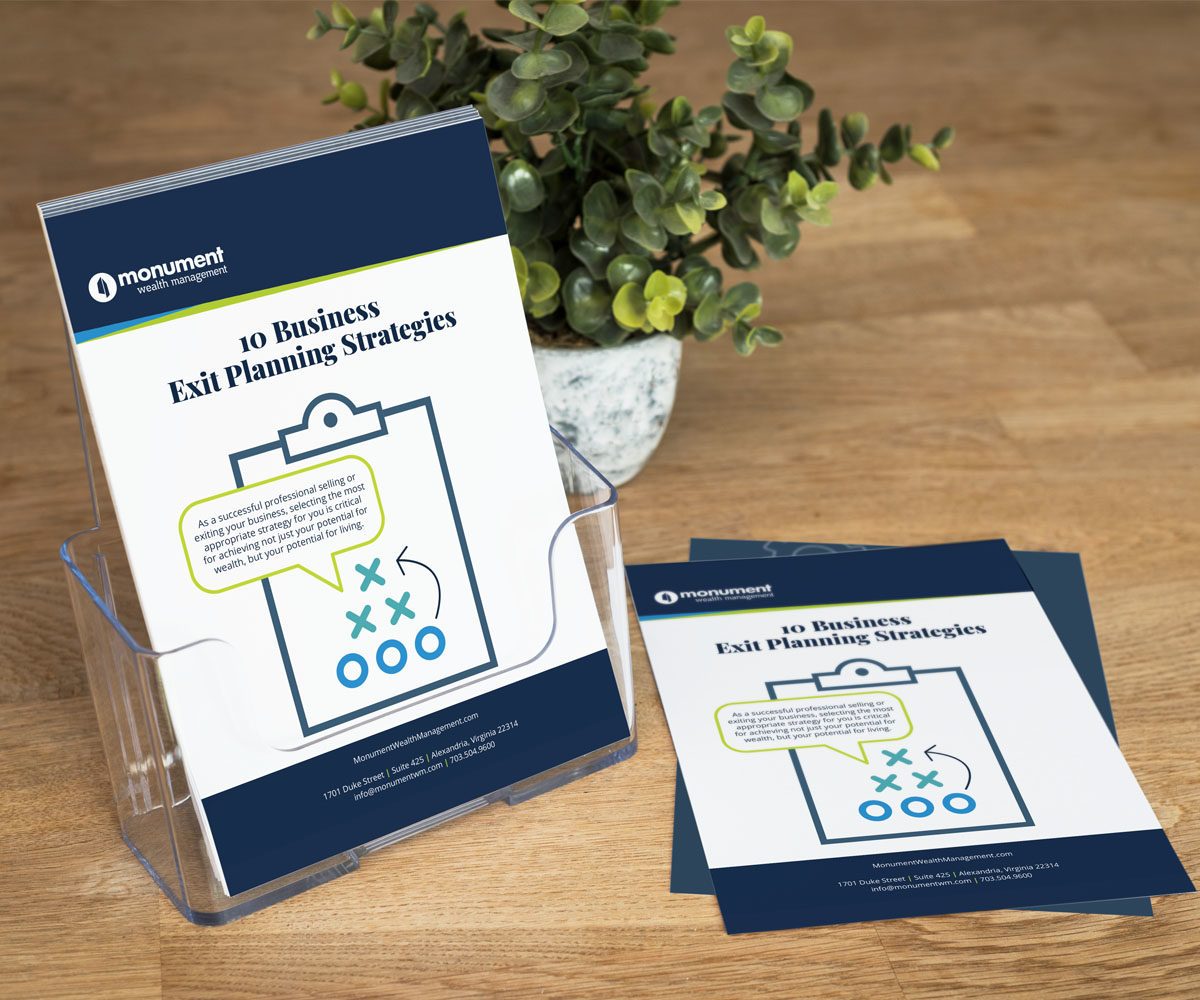Monument Wealth Management Articles
Secrets to Reducing Taxes on the Sale of Your Business

Share on your favorite platform, or by email
As a business owner considering your exit, when you think about the question “What’s the money for?” is “paying income taxes” a high priority? Chances are you are looking for ways to minimize the amount of taxes paid on a business sale, increasing the resources available to fund the things that are higher on your list.
While taxes are one of life’s certainties, with careful advanced planning (ideally before entertaining any offers) you may find ways to reduce them.
Maximize what’s taxed at advantageous rates
Sometimes, a business sale isn’t the sale of a single “business asset”–it’s often considered the sale of the individual assets of the business (think inventory, intangibles like goodwill, capital assets, etc.) for tax purposes.
This means that some assets may be taxed as ordinary income when sold while others may be taxed at lower, advantageous long-term capital gains rates. It’s worth noting, there may be big differences between the top marginal rate for ordinary income and the top rate paid on capital gains.
We are not tax experts, but we have seen a lot. Your CPA is well suited to weigh in on these nuances. That’s why it’s important to develop a relationship with a CPA who is proactive in helping you with this strategic planning, not someone who just checks the box on completing your tax returns each year.
Negotiate Allocations
As part of any prospective deal, you as the seller will need to negotiate with the buyer on just how much of the purchase price is allocated to capital assets vs. assets subject to ordinary income taxes.
While the IRS has guidelines on this, often there’s some flexibility as part of the deal-making. Your CPA and deal attorney are integral to this process and it is imperative that you consult with them on the negotiations
If your business is a corporation, you may be able to sell your shares in the business in lieu of an asset sale, resulting in taxes at capital gains rates vs. ordinary income. A strategic CPA can help with choices surrounding the best legal structure for your business well in advance of any potential sale – they will deliver value by helping you minimize taxes where possible.
Consider receiving payments over time vs. lump sum
Installment sales may help provide some control over tax planning by spreading income from the transaction (and the accompanying taxes) over a number of years vs. a single year. Moreover, installment payments may help you stay in a lower tax bracket (meaning you may be able to prevent other sources of income from being taxed at higher marginal rates).
Having less taxable income in a tax year also means that you may benefit from even lower tax rates on long-term capital gains (potentially 0-15%).
Minimizing taxable income also has other benefits, including:
- Lower Medicare Part B & D premiums if you are age 63 or older
- Lower threshold for AGI-dependent deductions, like deductible medical expenses
- Reducing the likelihood of being subject to the additional 3.8% net investment income tax
Installment sales are not without risk and may not be the best solution given your unique circumstances or needs from a business sale. Keep in mind, you are depending on the ability of the buyer/new owner to make the payments they owe. Having a good understanding of “what the money’s for” and your personal needs from a business exit can help clarify this decision-making.
Consider your legacy. Does charity fit in?
In answering the question “What’s the money for?”, you may discover that you have sufficient assets to fund your desired lifetime spending and accomplish all of your other goals and priorities (gifting to family and friends, setting the next generation up for success, etc.). This may lead you to consider charitable donations.
There are various charitable giving vehicles that may be beneficial to fund as part of your exit strategy if you decide that charitable giving is a priority, including a Donor Advised Fund.
A Donor Advised Fund (DAF) allows you to make a tax-deductible donation (the fund itself is considered a 501(c)(3)), grow funds available for charitable giving by investing the donation in an allocation of your choosing, and granting money out to charities over time. Because the DAF is a charitable vehicle, earnings on investments compound tax-free – potentially supercharging your giving and creating a multi-generational charitable legacy. Donating to a DAF can reduce taxable income in a year when it is abnormally high (like having proceeds from a business exit) and pre-fund a charitable legacy, removing the worry about factoring in charitable giving from your personal portfolio in the future.
Additionally, you don’t have to donate cash from a business transaction. You could, instead, donate appreciated stocks or other assets you already own to remove future capital gains potential!
Know all options available
Reducing taxes on the sale of your business can be crucial for your financial future. And even if you’re set, it can provide extra room to gift money to friends and family, create a college fund for your grandchildren, and even donate to charity. But doing it right makes all the difference – knowing your options, making the right moves and making them early, etc. That’s why you should add us to your team of experts. Alongside a CPA, tax attorney and deal attorney, we can work to help you holistically consider all the options.
At Monument Wealth Management, we build a Private Wealth Design unique to you. This serves as a blueprint of the rest of your life, financial and otherwise, clearly laying out your goals and how to use your resources to achieve them. We’ll even present different scenarios so you can decide what’s best for you.
Our advice is unfiltered–we tell it to you straight. Your goals are our goals, and rest assured we’ll be right with you every step of the way in your financial journey. If you want advice based on YOUR best interest, let’s talk.
*Monument is neither a law firm nor a certified public accounting firm and no portion of the blog content should be construed as legal or accounting advice. Please consult your CPA for tax advice.

Read Next:
10 Business Exit Planning Strategies
Ready for straightforward, unfiltered opinion and tailored advice for YOUR questions, not everyone else’s?
IMPORTANT DISCLOSURE INFORMATION
Please remember that past performance is no guarantee of future results. Different types of investments involve varying degrees of risk, and there can be no assurance that the future performance of any specific investment, investment strategy, or product (including the investments and/or investment strategies recommended or undertaken by Monument Capital Management, LLC [“Monument”]), or any non-investment related content, made reference to directly or indirectly in this blog will be profitable, equal any corresponding indicated historical performance level(s), be suitable for your portfolio or individual situation, or prove successful. Due to various factors, including changing market conditions and/or applicable laws, the content may no longer be reflective of current opinions or positions. Moreover, you should not assume that any discussion or information contained in this blog serves as the receipt of, or as a substitute for, personalized investment advice from Monument. To the extent that a reader has any questions regarding the applicability of any specific issue discussed above to his/her individual situation, he/she is encouraged to consult with the professional advisor of his/her choosing. No amount of prior experience or success should be construed that a certain level of results or satisfaction will be achieved if Monument is engaged, or continues to be engaged, to provide investment advisory services. Monument is neither a law firm nor a certified public accounting firm and no portion of the blog content should be construed as legal or accounting advice.
A copy of Monument’s current written disclosure Brochure discussing our advisory services and fees is available for review upon request or at www.monumentwealthmanagement.com/disclosures. Please Note: Monument does not make any representations or warranties as to the accuracy, timeliness, suitability, completeness, or relevance of any information prepared by any unaffiliated third party, whether linked to Monument’s website or blog or incorporated herein, and takes no responsibility for any such content. All such information is provided solely for convenience purposes only and all users thereof should be guided accordingly.
Historical performance results for investment indices, benchmarks, and/or categories have been provided for general informational/comparison purposes only, and generally do not reflect the deduction of transaction and/or custodial charges, the deduction of an investment management fee, nor the impact of taxes, the incurrence of which would have the effect of decreasing historical performance results. It should not be assumed that your Monument account holdings correspond directly to any comparative indices or categories. Please Also Note: (1) performance results do not reflect the impact of taxes; (2) comparative benchmarks/indices may be more or less volatile than your Monument accounts; and, (3) a description of each comparative benchmark/index is available upon request.
Please Remember: If you are a Monument client, please contact Monument, in writing, if there are any changes in your personal/financial situation or investment objectives for the purpose of reviewing/evaluating/revising our previous recommendations and/or services, or if you would like to impose, add, or to modify any reasonable restrictions to our investment advisory services. Unless, and until, you notify us, in writing, to the contrary, we shall continue to provide services as we do currently. Please Also Remember to advise us if you have not been receiving account statements (at least quarterly) from the account custodian.
